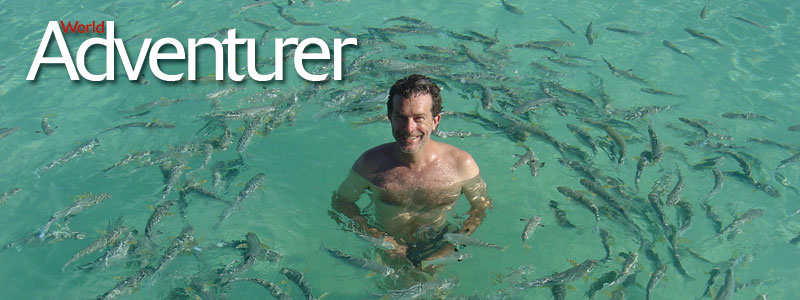The wild side of Richard Morecroft
Like so many children growing up near uncleared land, the lure of scurrying critters was ever-present.
"There were several undeveloped blocks near our house in Salisbury, just north of Adelaide," recalls Richard, "I was forever on the hunt for frogs, toads, lizards and, much to my parents alarm, snakes. Much later on, I even had a pet Diamond Python."
Then came the little orphaned flying fox that spent many hours comfortably parcelled away inside Richard's shirt (simulating a mother's care), even when reading the news. When the documentary, Raising Archie, produced by the ABC's Natural History Unit, went public, there was no keeping a lid on it. In fact, the modest production went on to win two ATOM awards and effectively became Richard's springboard into a whole new media genre.
"I'm delightfully surprised at the impact Archie made on people. I'm still asked even now, some fifteen years later, if I still have him and how he is," says Richard, "Archie really became an ambassador for his species and hopefully helped dismiss some of the stigma they suffered from as just a 'flying pest'."
Since Archie, the initial foray into wildlife seems to have become permanent. Richard now works in executive positions with WIRES (Wildlife Information and Rescue Service) and the Taronga Zoo Foundation. Raising Archie went on to become a best-selling book and led to further publishing exploits, both alone and with his partner, Alison Mackay, including Wolves of the Sea and Impossible Pets.
As well as an in-demand corporate speaker, Richard is never too far from the glare of studio lights. He is now very comfortable in his role as presenter of ABC TV's "Goes Wild".
Richard and Alison also enjoy travelling to exotic locations in search of interesting animals. Their journeys have taken them to the Antarctic, the Galapagos, Yosemite, French Polynesia and, closer to home, the World Heritage rainforest at Cape Tribulation. However, sometime encounters with the unusual can be sometimes as close as your front yard.
"Alison and I were enjoying a relaxing stroll along the beach at Vincentia, near where we live when we noticed a large mass on the sand. It looked like a seal - and it was - but not a more common fur seal or sea lion, but a leopard seal."*
"It was a young male, the seal equivalent of a teenager I suppose, and in fine physical shape. I called National Parks and they told me it was 'not that uncommon' for the occasional Leopard Seal to find its way this far north."
And where are you going on your next "safari"?
"There's so many intriguing lands and animals still left in the world, so places like Madagascar and the Amazon - where numerous delicate species are hanging on - still hold a lot of attraction for me."
*Stewart Campbell, Adventure Associates CEO and frequent expedition leader comments: "Leopard Seals are a cherished sighting even in their home territory - the deepest Antarctic. They prefer to feed on penguins, so perhaps the nearby fairy penguin colony at Jervis Bay was the attraction? I've even heard a story of a Leopard Seal being found with a Platypus in its stomach."
